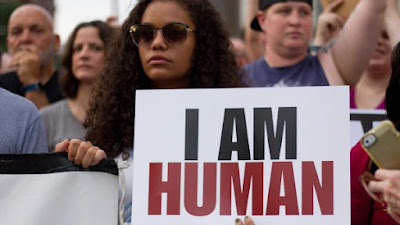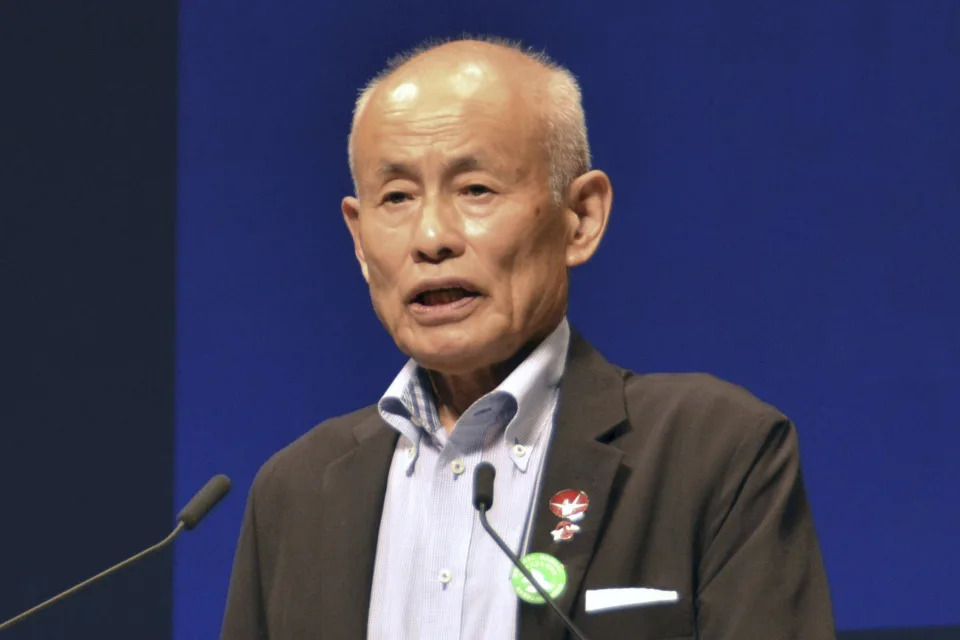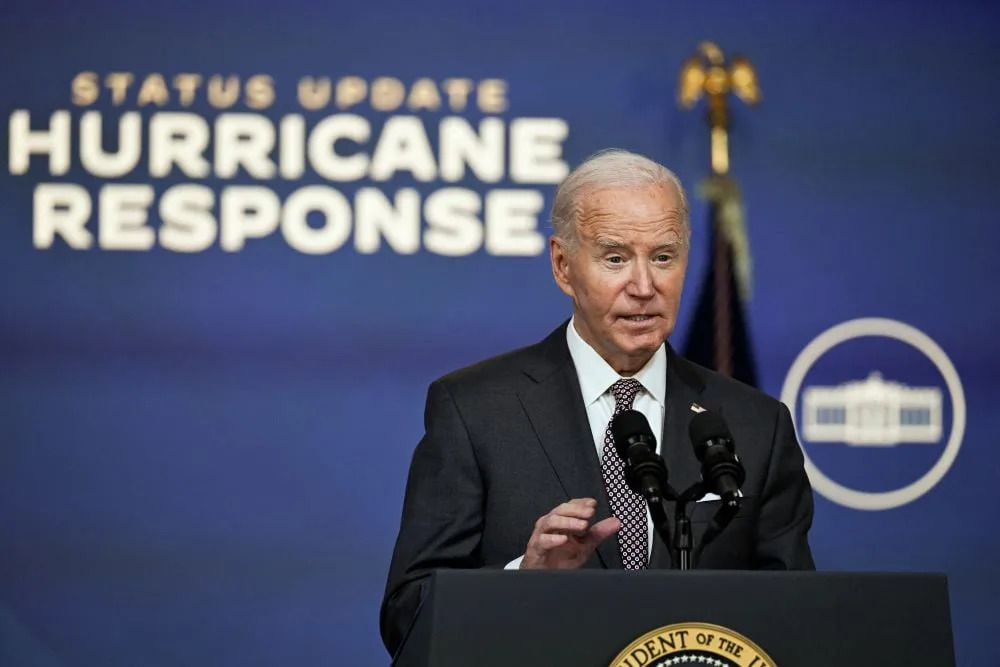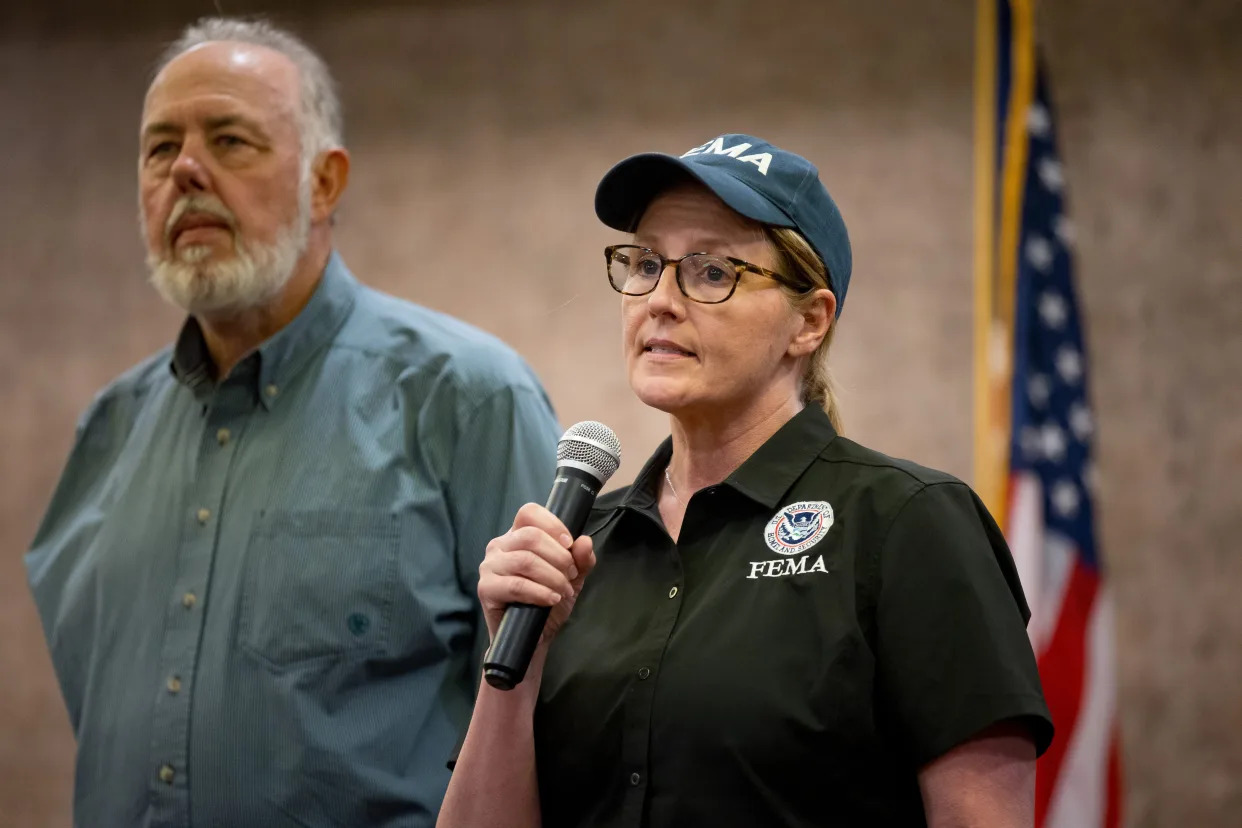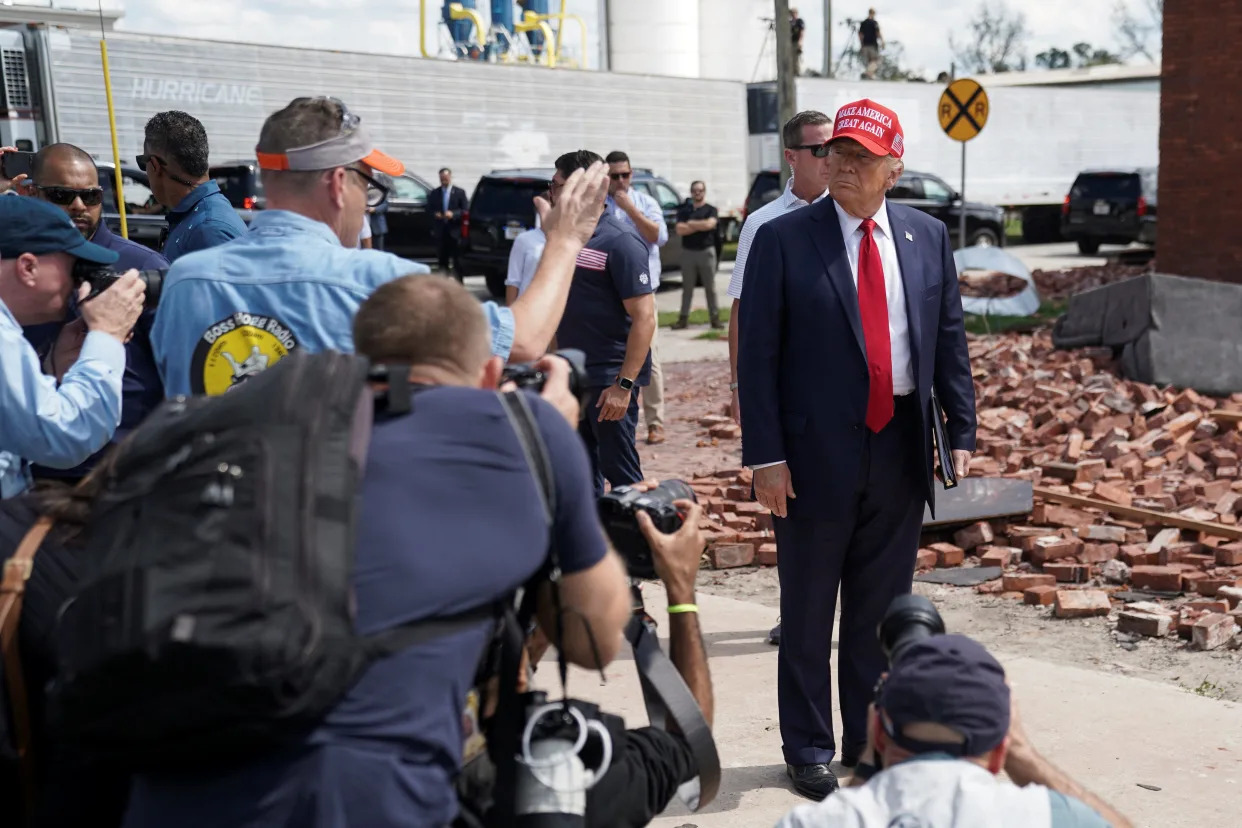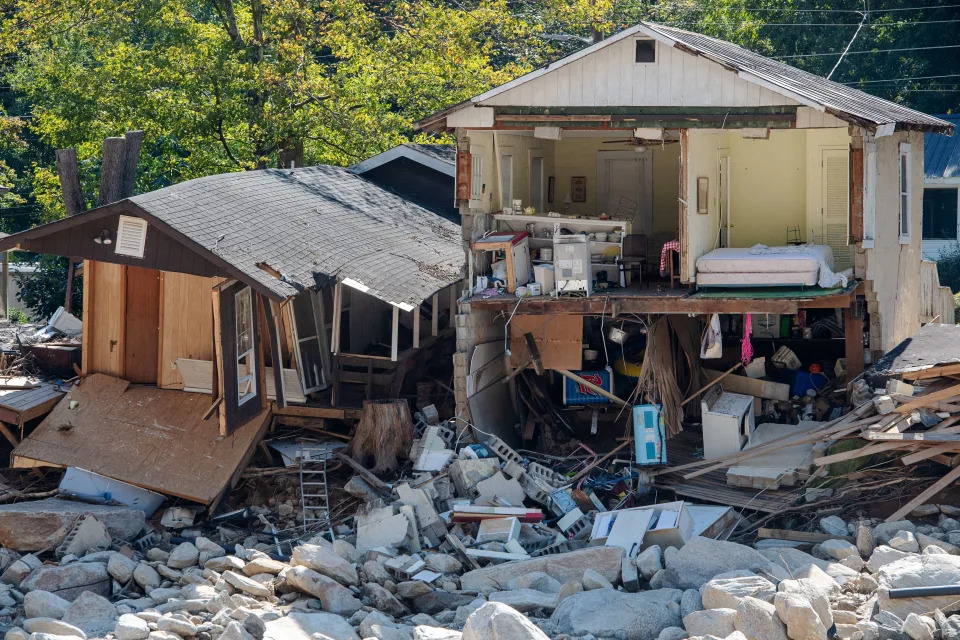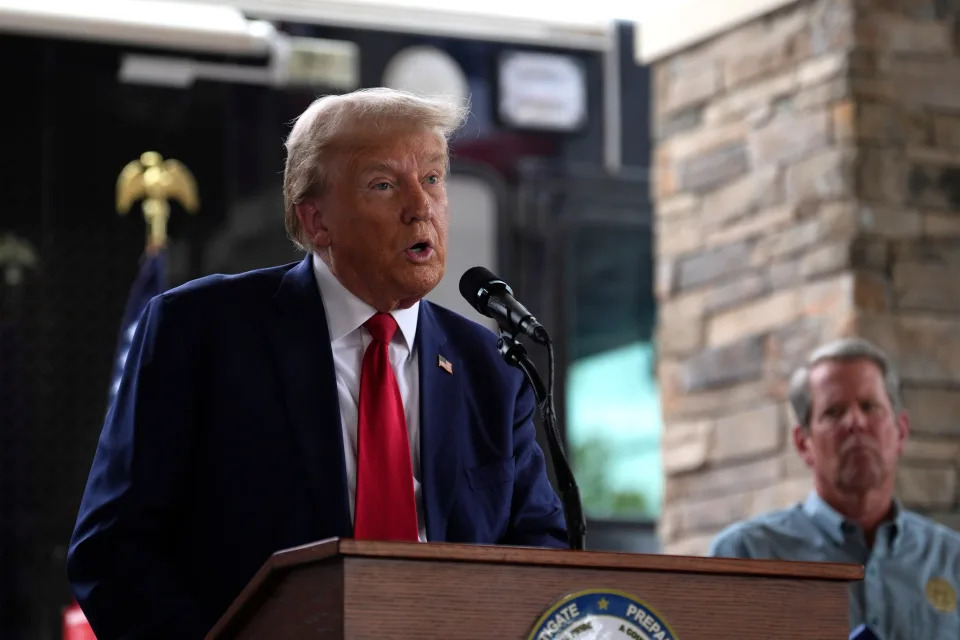Obama blasts men for finding 'all kinds of excuses' to avoid voting for a female president
Noah Bierman
Thu, October 10, 2024

Former President Obama speaks during a campaign event for Kamala Harris in Pittsburgh on Thursday. (Ryan Collerd / AFP via Getty Images)
Former President Obama joined the campaign trail for the final stretch Thursday with some "truths" for men, especially Black men, who he said were not delivering the enthusiasm for Vice President Kamala Harris that they did when he was running for president.
He told a group of campaign volunteers in Pittsburgh they have "a choice that is clear" between someone who "grew up like you, knows you," understands the same struggles and triumphs and has concrete proposals to make life better, and "someone who has consistently shown disregard, not just for the communities, but for you as a person.”
Obama said he had a problem with men who are "coming up with all kinds of excuses" to sit out the election or vote for former President Trump.
“Part of it makes me think that, well, you just aren't feeling the idea of having a woman as president, and you're coming up with other alternatives and other reasons for that,” he said.
Read more: Harris and Trump campaigns are targeting Black men, but many say they feel neglected
He said it was not acceptable that some men are “thinking about sitting out or supporting somebody who has a history of denigrating you, because you think that’s a sign of strength, because that’s what being a man is? Putting women down?”
The comments underscore the urgency Democrats are feeling in an election that remains a virtual toss-up with less than a month to go. Pennsylvania is the biggest of seven battleground states that are neck and neck in the polls and likely to decide the election.
The same polls show Harris with a wide lead among female voters but at a deficit with Trump among men. Harris is overwhelming ahead with Black men but Trump has been courting them, and polls suggest Harris has work to do to motivate them to come to the polls. Their impact could be especially large in Pennsylvania and Georgia, where both campaigns are making concerted efforts to appeal to them.
Trump may not have helped his own case Thursday when, speaking in Detroit, he disparaged the majority-Black city.
"Our whole country will end up being like Detroit if she's elected president," Trump said at the Detroit Economic Club, speaking of Harris. "We're not going to let her do that to this country."
Speaking to reporters at the Las Vegas airport Thursday, Harris called out Trump's comment. "It is great to be back in Las Vegas. ... By contrast, my opponent, Donald Trump, has yet again trashed another great American city, Detroit."
Trump's remarks echoed his labeling of Haiti and African nations as "shithole countries" during a 2018 White House meeting with a bipartisan group of lawmakers. He has also falsely accused Haitian migrants in Springfield, Ohio, of stealing cats and dogs to eat them.
Read more: Kamala Harris was hailed as ‘the female Barack Obama.’ It built credibility, and a burden
Obama did not reference those comments directly. But when he spoke for 45 minutes Thursday night at a large rally in Pittsburgh, he devoted most of his speech to the contrast between the two candidates' personal qualities.
"It's not just about policies that are on the ballot," Obama said. "It is about values and it is about character."
Obama touted Harris' stances on abortion, the Affordable Care Act and economic programs designed to help low-income people buy homes. He portrayed Trump as an old rich guy who complained and cared only about lowering taxes for people like himself and cast blame for all of the nation's problems on immigrants. He eviscerated the former president for lying to victims of the recent hurricanes about the federal government's efforts to deliver relief.
"If you had a family member who acted like that, you might still love him, but you'd tell him, 'You got a problem,'" Obama said. "And you wouldn't put him in charge of anything."
"And yet, when Donald Trump lies or cheats or shows utter disregard for our Constitution, when he calls POWs losers or fellow citizens vermin, people make excuses for it," Obama continued. "They think it's OK. They think, well, at least he's, he's owning the libs."
This story originally appeared in Los Angeles Times.
Thu, October 10, 2024

Former President Obama speaks during a campaign event for Kamala Harris in Pittsburgh on Thursday. (Ryan Collerd / AFP via Getty Images)
Former President Obama joined the campaign trail for the final stretch Thursday with some "truths" for men, especially Black men, who he said were not delivering the enthusiasm for Vice President Kamala Harris that they did when he was running for president.
He told a group of campaign volunteers in Pittsburgh they have "a choice that is clear" between someone who "grew up like you, knows you," understands the same struggles and triumphs and has concrete proposals to make life better, and "someone who has consistently shown disregard, not just for the communities, but for you as a person.”
Obama said he had a problem with men who are "coming up with all kinds of excuses" to sit out the election or vote for former President Trump.
“Part of it makes me think that, well, you just aren't feeling the idea of having a woman as president, and you're coming up with other alternatives and other reasons for that,” he said.
Read more: Harris and Trump campaigns are targeting Black men, but many say they feel neglected
He said it was not acceptable that some men are “thinking about sitting out or supporting somebody who has a history of denigrating you, because you think that’s a sign of strength, because that’s what being a man is? Putting women down?”
The comments underscore the urgency Democrats are feeling in an election that remains a virtual toss-up with less than a month to go. Pennsylvania is the biggest of seven battleground states that are neck and neck in the polls and likely to decide the election.
The same polls show Harris with a wide lead among female voters but at a deficit with Trump among men. Harris is overwhelming ahead with Black men but Trump has been courting them, and polls suggest Harris has work to do to motivate them to come to the polls. Their impact could be especially large in Pennsylvania and Georgia, where both campaigns are making concerted efforts to appeal to them.
Trump may not have helped his own case Thursday when, speaking in Detroit, he disparaged the majority-Black city.
"Our whole country will end up being like Detroit if she's elected president," Trump said at the Detroit Economic Club, speaking of Harris. "We're not going to let her do that to this country."
Speaking to reporters at the Las Vegas airport Thursday, Harris called out Trump's comment. "It is great to be back in Las Vegas. ... By contrast, my opponent, Donald Trump, has yet again trashed another great American city, Detroit."
Trump's remarks echoed his labeling of Haiti and African nations as "shithole countries" during a 2018 White House meeting with a bipartisan group of lawmakers. He has also falsely accused Haitian migrants in Springfield, Ohio, of stealing cats and dogs to eat them.
Read more: Kamala Harris was hailed as ‘the female Barack Obama.’ It built credibility, and a burden
Obama did not reference those comments directly. But when he spoke for 45 minutes Thursday night at a large rally in Pittsburgh, he devoted most of his speech to the contrast between the two candidates' personal qualities.
"It's not just about policies that are on the ballot," Obama said. "It is about values and it is about character."
Obama touted Harris' stances on abortion, the Affordable Care Act and economic programs designed to help low-income people buy homes. He portrayed Trump as an old rich guy who complained and cared only about lowering taxes for people like himself and cast blame for all of the nation's problems on immigrants. He eviscerated the former president for lying to victims of the recent hurricanes about the federal government's efforts to deliver relief.
"If you had a family member who acted like that, you might still love him, but you'd tell him, 'You got a problem,'" Obama said. "And you wouldn't put him in charge of anything."
"And yet, when Donald Trump lies or cheats or shows utter disregard for our Constitution, when he calls POWs losers or fellow citizens vermin, people make excuses for it," Obama continued. "They think it's OK. They think, well, at least he's, he's owning the libs."
This story originally appeared in Los Angeles Times.
Sharon Knolle
Thu, October 10, 2024

Barack Obama laid into fellow former President Donald Trump so thoroughly on Thursday that more than one X user quipped, “I’d like to report a murder.“
Obama, speaking at a rally in Pittsburgh, ticked off a long list of reasons why voters should reject Trump and vote for Democratic nominee Kamala Harris next month.
He disparaged “the constant attempts to sell you stuff” including gold sneakers, a $100,000 watch and the Trump Bible. “Who does that?” asked Obama with an incredulous shrug.
“You know, he wants you to buy the word of God, Donald Trump edition. Got his name right there next to Matthew and Luke,” he said of Trump’s “God Bless the USA Bibles,” which, it was reported this week, were printed in China. They are priced at $59.99 each.
The 44th president continued to blast the 45th, recalling his shock at finding out how much diapers cost after his oldest daughter Malia was born. “Do you think Donald Trump ever changed a diaper?,” he asked about the father of five.
One attendee shouted, “His own!”
Obama admitted with a laugh, “I almost said that, but I decided I should not say it.”
Trump was dubbed “Diaper Don” by the media in 2020 over reports that he wore adult diapers while filming the reality competition “The Apprentice.”
Trump supporters not only shrugged at the suggestion when it resurfaced during Trump’s tax fraud trial earlier this year, but proudly began wearing the absorbent underwear themselves at campaign events and carrying signs that read “real men wear diapers.”
Obama also blasted Trump for taking credit for the state of the economy when he took office in 2021. “I remember that economy when he first came in being pretty good. Yeah, it was pretty good, because it was my economy. It wasn’t something he did. I spent eight years cleaning up the mess that the Republicans had left me,” he said.
Watch a clip from the rally in the video above, and click through to @Acyn’s X account for more.
The post Obama Roasts Trump for Everything From Selling Bibles to Needing a Diaper at Pittsburgh Rally | Video appeared first on TheWrap.
Donald Trump Goes to Detroit and Insults the Entire City
Mini Racker
Thu, October 10, 2024

Donald Trump on Thursday addressed business leaders in Detroit, where he insulted their city and big companies.
“You want to know the truth?” Trump told members of the Detroit Economic Club as he painted a picture of what his opponent would do to America. “It’ll be like Detroit. Our whole country will end up being like Detroit if she’s your president. You’re going to have a mess on your hands.”
Audience members clapped when Trump said he wouldn’t allow Kamala Harris to make the rest of the country mirror their hometown, suggesting that, at least among his fans, Trump’s comments weren’t too off base.
The former president has insulted Democratic-leaning urban areas before, especially by claiming they are hotspots of voter fraud. But three weeks before the election in a crucial swing state, the derision of the city was shocking.
Michigan Democrats hit back. Hard.
“I represent Detroit in Congress,” Rep. Shri Thanedar posted on X. “Detroit is a city with a booming economy, diverse culture, and some of the best people in America. Donald Trump: keep Detroit and our people out of your mouth. We will elect Kamala Harris.”
Gov. Gretchen Whitmer also attacked Trump's election-eve insult against Michigan's Motor City.
Trump and Harris are locked in a razor-thin race in the state, with Harris just slightly ahead in the polls. The Great Lakes is part of the “blue wall,” which will be key to winning the presidency. The former president won the state by a tiny margin in 2016, but lost in 2020.
On Thursday, Trump sought to change that narrative by positioning himself as Detroit’s savior—if it would only vote for him. In particularly brutal language, he emphasized that he would be the one to ensure the U.S. makes better trade deals to rein in big, powerful companies “outside of our world.”
“We allowed them to come in and raid and rape our country,” Trump said, mockingly adding, “Oh, he used the word rape.’ That’s right, I used the word rape.”
For emphasis he repeated, “They RAPED our country.”
Thu, October 10, 2024

Donald Trump on Thursday addressed business leaders in Detroit, where he insulted their city and big companies.
“You want to know the truth?” Trump told members of the Detroit Economic Club as he painted a picture of what his opponent would do to America. “It’ll be like Detroit. Our whole country will end up being like Detroit if she’s your president. You’re going to have a mess on your hands.”
Audience members clapped when Trump said he wouldn’t allow Kamala Harris to make the rest of the country mirror their hometown, suggesting that, at least among his fans, Trump’s comments weren’t too off base.
The former president has insulted Democratic-leaning urban areas before, especially by claiming they are hotspots of voter fraud. But three weeks before the election in a crucial swing state, the derision of the city was shocking.
Michigan Democrats hit back. Hard.
“I represent Detroit in Congress,” Rep. Shri Thanedar posted on X. “Detroit is a city with a booming economy, diverse culture, and some of the best people in America. Donald Trump: keep Detroit and our people out of your mouth. We will elect Kamala Harris.”
Gov. Gretchen Whitmer also attacked Trump's election-eve insult against Michigan's Motor City.
Trump and Harris are locked in a razor-thin race in the state, with Harris just slightly ahead in the polls. The Great Lakes is part of the “blue wall,” which will be key to winning the presidency. The former president won the state by a tiny margin in 2016, but lost in 2020.
On Thursday, Trump sought to change that narrative by positioning himself as Detroit’s savior—if it would only vote for him. In particularly brutal language, he emphasized that he would be the one to ensure the U.S. makes better trade deals to rein in big, powerful companies “outside of our world.”
“We allowed them to come in and raid and rape our country,” Trump said, mockingly adding, “Oh, he used the word rape.’ That’s right, I used the word rape.”
For emphasis he repeated, “They RAPED our country.”









